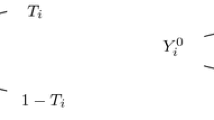Abstract
This paper considers the problem of unbiasedly estimating the population proportion when the study variable is potential sensitive in nature. In order to protect the respondent’s privacy, various techniques of generating randomized response rather than direct response are available in the literature. But the theory concerning them is developed only under the hypothesis of completely truthful reporting. Actually, the occurrence of untruthful reporting is a prospect in dealing with highly sensitive matters such as abortion or socially deviant behaviors. Illustrating Warner’s [(1965), Journal of the American Statistical Association. 60: 63–69] randomized response technique we show how unbiased estimation of the population proportion can be extended to cover a case when some respondents may lie.
Similar content being viewed by others
References
M. Bhargava R. Singh (2000) ArticleTitleA modified randomization device for Warner’s model Statistica 60 315–321
H.J. Chang K.C. Huang (2001) ArticleTitleEstimation of proportion and sensitivity of a qualitative character Metrika 53 269–280 Occurrence Handle10.1007/s001840100109 Occurrence HandleMR1855498
A. Chaudhuri (2001) ArticleTitleUsing randomized response from a complex survey to estimate a sensitive proportion in a dichotomous finite population Journal of Statistical Planning and Inference 94 37–42 Occurrence Handle10.1016/S0378-3758(00)00210-X
A. Chaudhuri R. Mukerjee (1988) Randomized Response: Theory and Techniques Marcel Dekker New York
T.C. Chua A.K. Tsui (2000) ArticleTitleProcuring honest responses indirectly Journal of Statistical Planning and Inference 90 107–116 Occurrence Handle10.1016/S0378-3758(00)00109-9 Occurrence HandleMR1791584
J. Fox P. Tracy (1986) Randomized Response: A Method for Sensitive Surveys Sage Publication Beverly Hills
J.C. Hosseini R.L. Armacost (1993) ArticleTitleGathering sensitive information in organization American Behavioral Scientist 36 443–471
J. Kerkvliet (1994) ArticleTitleEstimating a logit model with randomized data: The case of cocaine use Australian Journal of Statistics 36 9–20
A.Y.C. Kuk (1990) ArticleTitleAsking sensitive questions indirectly Biometrika 77 436–438 Occurrence HandleMR1064822
J.A. Landsheer P.G.M. Van der Heijden G. Van Gils (1999) ArticleTitleTrust and understanding, two psychological aspects of randomized response: A study of a method for improving the estimate of social security fraud Quality & Quantity 33 1–12
M. Mahmood S. Singh S. Horn (1998) ArticleTitleOn the confidentiality guaranteed under randomized response sampling: A comparison with several new techniques Biometrical Journal 40 237–242 Occurrence Handle10.1002/(SICI)1521-4036(199806)40:2<237::AID-BIMJ237>3.0.CO;2-N Occurrence HandleMR1625965
N.S. Mangat (1994) ArticleTitleAn improved randomized response strategy Journal of the Royal Statistical Society B 56 93–95 Occurrence HandleMR1257798
N.S. Mangat R. Singh (1990) ArticleTitleAn alternative randomized response procedure Biometrika 77 439–442 Occurrence HandleMR1064823
N.S. Mangat R. Singh (1991) ArticleTitleAn alternative approach to randomized response survey Statistica 51 327–332
N.S. Mangat R. Singh S. Singh (1995a) ArticleTitleUnrelated question randomized response model without randomization device Estadistica 47 59–68 Occurrence HandleMR1435364
N.S. Mangat R. Singh S. Singh D.R. Bellhouse H.B. Kashani (1995b) ArticleTitleOn efficiency of estimator using distinct respondents in randomized response survey Survey Methodology 21 21–23
N.S. Mangat R. Singh S. Singh (1997) ArticleTitleViolation of respondent’s privacy in Moor’s model – its rectification through a random group strategy Communications in Statistics – Theory and Methods 26 743–754
N.J. Scheers (1992) ArticleTitleA review of randomized response techniques Measurement and Evaluation in Counseling and Development 25 27–41
S. Singh S. Horn S. Chowdhuri (1998) ArticleTitleEstimation of stigmatized characteristics of a hidden gang in finite population Australian & New Zealand Journal of Statistics 40 291–297
S. Singh A.H. Joarder M.L. King (1996) ArticleTitleRegression analysis using scrambled responses Australian Journal of Statistics 38 201–211
S. Singh R. Singh N.S. Mangat (2000) ArticleTitleSome alternative strategies to Moor’s model in randomized response sampling Journal of Statistical Planning and Inference 83 243–255 Occurrence Handle10.1016/S0378-3758(99)00092-0 Occurrence HandleMR1741455
D.S. Tracy N.S. Mangat (1998) ArticleTitleComparisons of distinct units based estimators in unrelated question randomized response model International Journal of Mathematical Statistical Sciences 7 229–240 Occurrence HandleMR1666379
U.N. Umesh R.A. Peterson (1991) ArticleTitleA critical evaluation of the randomized response method: Application, validation, and research agenda Sociological Methods & Research 20 104–138
P.G.M. Van der Heijden (2000) ArticleTitleA comparison of randomized response, computer-assisted self-interview, and face-to-face direct questioning Sociological Methods & Research 28 505–537
S.L. Warner (1965) ArticleTitleRandomized response: A survey technique for eliminating evasive answer bias Journal of the American Statistical Association 60 63–69 Occurrence Handle12261830
Author information
Authors and Affiliations
Corresponding author
Rights and permissions
About this article
Cite this article
Huang, KC., Lan, CH. & Kuo, MP. Detecting Untruthful Answering in Randomized Response Sampling. Qual Quant 39, 659–669 (2005). https://doi.org/10.1007/s11135-005-1613-4
Issue Date:
DOI: https://doi.org/10.1007/s11135-005-1613-4



